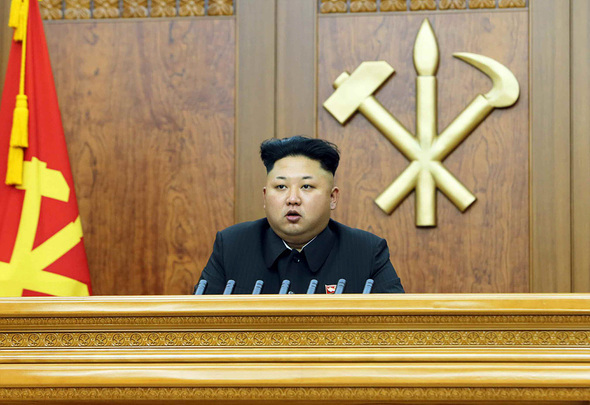 |
North Korean leader Kim Jong-un gives his New Year’s address in Pyongyang, Jan. 1. The Rodong Sinmun, North Korea’s official newspaper, posted the text of the address on its first and second pages. (KCNA/Yonhap News) |
Washington may be seeking to discourage Seoul from efforts toward improving ties with the North
Following the executive order issued by US President Barack Obama on Jan. 2 to impose new sanctions on North Korea in connection with a hack on Sony Pictures, some observers think that the American factor could cast a pall on changes in inter-Korean relations. The US move can be interpreted as a demand for the South Korean government to slow down efforts to improve relations with North Korea.The effect that the new sanctions on the North will have on inter-Korean relations can be examined from three angles: how strong North Korea’s response will be, what the US really hopes to achieve, and how the South Korean government will deal with the situation.First, North Korea’s response to the sanctions has not been as intense as in the past.During an interview with a reporter from the North Korean state-run Korea Central News Agency (KCNA) on Jan. 4, a spokesperson for North Korea’s Foreign Ministry only repeated Pyongyang’s standard position that North Korea’s determination and resolve to preserve the dignity of the people and its independence would become even firmer.“[The sanctions] make it clear that the US remains unable to escape from its inveterate antipathy and hostility toward North Korea,” the spokesperson said during the interview.On Jan. 3, the Choson Sinbo, the official publication of Chongryun (a pro-North Korea association of ethnic Koreans in Japan), dismissed the sanctions as “ineffective,” pointing out that the individuals and organizations included in the sanctions are not engaged in transactions with the US.This response is mild, especially considering remarks made by North Korean authorities just a few weeks before. When President Obama promised to make a “proportional response” to the hack on Sony Pictures, the political bureau of the North Korean Ministry of Defense issued a statement in which it threatened to wage an “ultra hard-line retaliatory war” aimed at the White House, the Pentagon, and the whole of the continental US, which it called a “base of terrorism.”The problem is that the sanctions may be motivated by US discomfort about sudden signs of change in inter-Korean relations. On Dec. 29, the South Korean government abruptly proposed talks with Pyongyang, and on Jan. 1, North Korean leader Kim Jong-un mentioned the possibility of a summit with President Park Geun-hye.To be sure, the US does not want military tensions between North and South Korea to increase. However, the sanctions suggest that the US is unhappy with separate negotiations between North Korea and neighboring countries, since these could blunt the focus on North Korea’s nuclear weapons and missile programs, which are key interests to the US. The US is concerned that such negotiations could undermine efforts to keep other countries cooperating with its sanctions-centered policy.For reasons such as these, the US government only offered lukewarm support for recent negotiations between North Korea and Japan about Japanese abductees and for the visit of Vice Marshal Hwang Pyong-so and two other senior North Korea officials to South Korea in Oct. 2014.When the South Korean government suggested dialogue with North Korea on Dec. 29, the US government’s response was apathetic. US officials told South Korean reporters to direct their inquiries to the South Korean government, since South Korea was taking the lead on the issue.Furthermore, while Kim Jong-un expressed a forward-looking attitude on the issue of inter-Korean relations during his New Year’s address, he made no mention of the issue of denuclearization, an issue of interest to the US. This indicates that in 2015 North Korea will continue to pursue its two-track policy of pursuing economic development and building its nuclear arsenal.US concerns of this sort are also reflected in the inclusion on the sanctions list of a North Korean state-run Mining Development Trading Corporation in charge of importing and exporting weapons, a company that was unlikely to be connected with the hack.With the US asking the South to slow down change in inter-Korean relations - and with the US able to put the brakes on that change if it so chooses - the big question is how the South Korean government will choose to act.In the past, the general view has been that President Park Geun-hye has reluctantly followed the American lead on the question of North Korea nuclear weapons, unable to overcome the US’s hard-line stance on the issue.“It is unclear whether the South Korean government is willing to risk conflict in its relationship with the US in order to bring about results in its relationship with North Korea. The signs of change in inter-Korean relations might never go beyond rhetoric,” said Kim Chang-soo, director of research at the Korea National Strategy Institute. By Yi Yong-in, staff reporter Please direct questions or comments to [english@hani.co.kr]
english.hani.co.kr/arti/english_edition/e_northkorea/672143.html



